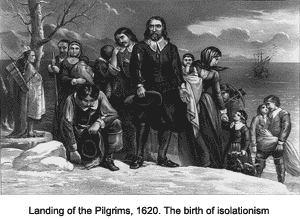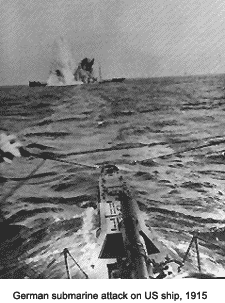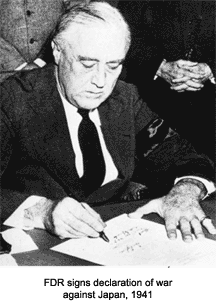Isolationism refers to America's longstanding reluctance to become involved in European alliances and wars. Isolationists held the view that America's perspective on the world was different from that of European societies and that America could advance the cause of freedom and democracy by means other than war.
American isolationism did not mean disengagement from the world stage. Isolationists were not averse to the idea that the United States should be a world player and even further its territorial, ideological and economic interests, particularly in the Western Hemisphere.
The colonial period
 The isolationist perspective dates to colonial days. The colonies were populated by many people who had fled from Europe, where there was religious persecution, economic privation and war. Their new homeland was looked upon as a place to make things better than the old ways. The sheer distance and rigors of the voyage from Europe tended to accentuate the remoteness of the New World from the Old. The roots of isolationism were well established years before independence, notwithstanding the alliance with France during the War for Independence.
Thomas Paine crystallized isolationist notions in his work Common Sense, which presents numerous arguments for shunning alliances. Paine's tract exerted so much political influence that the Continental Congress strove against striking an alliance with France and acquiesced only when it appeared probable that the war for independence could not be won without one.
George Washington in his Farewell Address placed the accent on isolationism in a manner that would be long remembered:
The isolationist perspective dates to colonial days. The colonies were populated by many people who had fled from Europe, where there was religious persecution, economic privation and war. Their new homeland was looked upon as a place to make things better than the old ways. The sheer distance and rigors of the voyage from Europe tended to accentuate the remoteness of the New World from the Old. The roots of isolationism were well established years before independence, notwithstanding the alliance with France during the War for Independence.
Thomas Paine crystallized isolationist notions in his work Common Sense, which presents numerous arguments for shunning alliances. Paine's tract exerted so much political influence that the Continental Congress strove against striking an alliance with France and acquiesced only when it appeared probable that the war for independence could not be won without one.
George Washington in his Farewell Address placed the accent on isolationism in a manner that would be long remembered:
"The great rule of conduct for us, in regard to foreign nations, is in extending our commercial relations, to have with them as little political connection as possible. Europe has a set of primary interests, which to us have none, or a very remote relation. Hence she must be engaged in frequent controversies the causes of which are essentially foreign to our concerns. Hence, therefore, it must be unwise in us to implicate ourselves, by artificial ties, in the ordinary vicissitudes of her politics, or the ordinary combinations and collisions of her friendships or enmities."Washington was promulgating a perspective that was already venerable and accepted by many. The United States terminated its alliance with France, after which America's third president, Thomas Jefferson, admonished in his inaugural address, "peace, commerce, and honest friendship with all nations, entangling alliances with none." The 19th century The United States remained politically isolated all through the 19th century and the beginning of the 20th, an unusual feat in western history. Historians have attributed the fact to a geographical position at once separate and far removed from Europe. During the 1800s, the United States spanned North America and commenced to piece together an empire in the Caribbean and the Pacific — without departing from the traditional perspective. It fought the War of 1812, the Mexican War, and the Spanish-American War without joining alliances or fighting in Europe. The isolationist point of view was still viable in 1823 when President James Monroe gave voice to what would later be termed the Monroe Doctrine, "In the wars of the European powers, in matters relating to themselves, we have never taken part, nor does it comport with our policy, so to do." Nevertheless, pressures were mounting abroad that would undercut and demolish that policy near the mid-20th century. The advent of German and Japanese expansionism would threaten and later nearly snuff out the contented aloofness enjoyed by the United States. The United States' occupation of the Philippines during the Spanish-American War thrust U.S. interests into the far western Pacific Ocean — Imperial Japan's sphere of interest. Such improved transportation and communication as steamships, undersea cable, and radio linked the two continents. The growth of shipping and foreign trade slowly enhanced America's world role. There also were basic changes at home. The historic ascendancy of urban-based business, industry, and finance, and the sidelining of rural and small-town America — the bastion of isolationism — contributed to its eventual demise. World War I Germany's unfettered submarine warfare against American ships during World War I provoked the U.S. into abandoning the neutrality it had upheld for so many years. The country's resultant participation in World War I against the Central Powers marked its first major departure from isolationist policy. When the war ended, however, the United States was quick to leave behind its European commitment. Regardless of President Woodrow Wilson's efforts, the Senate repudiated the Treaty of Versailles that ended the war, and the United States failed to become a member of the League of Nations.
 Indeed, isolationism would persist for a few more decades. During the 1920s, American foreign affairs took a back seat. In addition, America tended to insulate itself in terms of trade. Tariffs were imposed on foreign goods to shield U.S. manufacturers.
America turned its back on Europe by restricting the number of immigrants permitted into the country. Until World War I, millions of people, mostly from Europe, had come to America to seek their fortune and perhaps flee poverty and persecution. Britons and Irishmen, Germans and Jews constituted the biggest groups. In 1921 the relatively liberal policy ended and quotas were introduced. By 1929 only 150,000 immigrants per year were allowed in.
During the 1920s and 1930s, the preponderance of Americans remained opposed to enmeshment in Europe's alliances and wars. Isolationism was solid in hinterland and small-town America in the Midwest and Great Plains states, and among Republicans. It claimed numerous sympathizers among Irish- and German-Americans. William Jennings Bryan of Nebraska, Robert M. La Follette of Wisconsin, and George W. Norris of Nebraska were among western agrarian progressives who argued fervently against involvement. Assuming an us-versus-them stance, they castigated various eastern, urban elites for their engagement in European affairs.
World War II
The year 1940 signaled a final turning point for isolationism. German military successes in Europe and the Battle of Britain prompted nationwide American rethinking about its posture toward the war. If Germany and Italy established hegemony in Europe and Africa, and Japan swept East Asia, many believed that the Western Hemisphere might be next. Even if America managed to repel invasions, its way of life might wither if it were forced to become a garrison state. By the autumn of 1940, many Americans believed it was necessary to help defeat the Axis — even if it meant open hostilities.
Indeed, isolationism would persist for a few more decades. During the 1920s, American foreign affairs took a back seat. In addition, America tended to insulate itself in terms of trade. Tariffs were imposed on foreign goods to shield U.S. manufacturers.
America turned its back on Europe by restricting the number of immigrants permitted into the country. Until World War I, millions of people, mostly from Europe, had come to America to seek their fortune and perhaps flee poverty and persecution. Britons and Irishmen, Germans and Jews constituted the biggest groups. In 1921 the relatively liberal policy ended and quotas were introduced. By 1929 only 150,000 immigrants per year were allowed in.
During the 1920s and 1930s, the preponderance of Americans remained opposed to enmeshment in Europe's alliances and wars. Isolationism was solid in hinterland and small-town America in the Midwest and Great Plains states, and among Republicans. It claimed numerous sympathizers among Irish- and German-Americans. William Jennings Bryan of Nebraska, Robert M. La Follette of Wisconsin, and George W. Norris of Nebraska were among western agrarian progressives who argued fervently against involvement. Assuming an us-versus-them stance, they castigated various eastern, urban elites for their engagement in European affairs.
World War II
The year 1940 signaled a final turning point for isolationism. German military successes in Europe and the Battle of Britain prompted nationwide American rethinking about its posture toward the war. If Germany and Italy established hegemony in Europe and Africa, and Japan swept East Asia, many believed that the Western Hemisphere might be next. Even if America managed to repel invasions, its way of life might wither if it were forced to become a garrison state. By the autumn of 1940, many Americans believed it was necessary to help defeat the Axis — even if it meant open hostilities.
 Many others still backed the noninterventionist America First Committee in 1940 and 1941, but isolationists failed to derail the Roosevelt administration's plans to aid targets of Axis aggression with means short of war. Most Americans opposed any actual declaration of war on the Axis countries, but everything abruptly changed when Japan naval forces sneak-attacked Pearl Harbor on December 7, 1941. Germany and Italy declared war on the United States four days later. America galvanized itself for full-blown war against the Axis powers.
The demise of isolationism
The isolationist point of view did not completely disappear from American discourse, but never again did it figure prominently in American policies and affairs. Countervailing tendencies that would outlast the war were at work. During the war, the Roosevelt administration and other leaders inspired Americans to favor the establishment of the United Nations (1945), and following the war, the threat embodied by the Soviet Union under Joseph Stalin dampened any comeback of isolationism.
The postwar world environment, in which the United States played a leading role, would change with the triumph of urban industry and finance, expanded education and information systems, advanced military technology, and leadership by internationalists. A few leaders would rise to speak of a return to America's traditional policies of nonintervention, but in reality, traditional American isolationism was obsolete.
Many others still backed the noninterventionist America First Committee in 1940 and 1941, but isolationists failed to derail the Roosevelt administration's plans to aid targets of Axis aggression with means short of war. Most Americans opposed any actual declaration of war on the Axis countries, but everything abruptly changed when Japan naval forces sneak-attacked Pearl Harbor on December 7, 1941. Germany and Italy declared war on the United States four days later. America galvanized itself for full-blown war against the Axis powers.
The demise of isolationism
The isolationist point of view did not completely disappear from American discourse, but never again did it figure prominently in American policies and affairs. Countervailing tendencies that would outlast the war were at work. During the war, the Roosevelt administration and other leaders inspired Americans to favor the establishment of the United Nations (1945), and following the war, the threat embodied by the Soviet Union under Joseph Stalin dampened any comeback of isolationism.
The postwar world environment, in which the United States played a leading role, would change with the triumph of urban industry and finance, expanded education and information systems, advanced military technology, and leadership by internationalists. A few leaders would rise to speak of a return to America's traditional policies of nonintervention, but in reality, traditional American isolationism was obsolete.